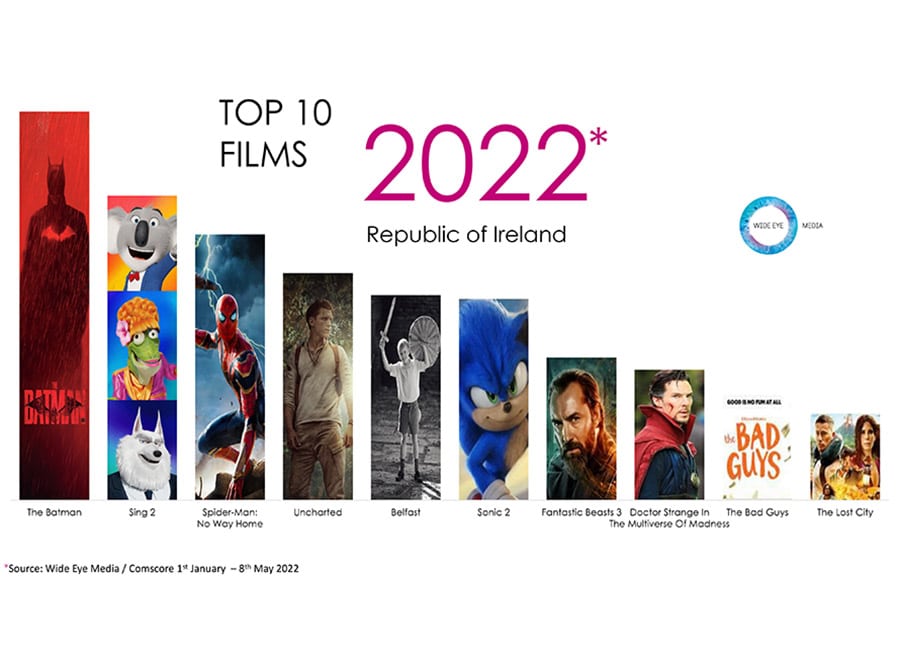Streaming and Covid-19 were supposed to have marched cinema to the chopping block, but the industry in Ireland, at least, is emerging from the pandemic on stable footing.
US commentary laments the demise of mid-budget films for adults, which are now more likely to air on television as stretched-out miniseries, and box-office charts dominated by animated films for kids and blockbuster franchises.
The struggle stateside to get audiences in seats for films not attached to precious intellectual property with in-built name recognition is an existential question for Hollywood, but going to the cinema remains a favourite pastime for Irish consumers regardless.
According to the International Union of Cinemas (UNIC), a trade association representing cinema exhibitors across 37 European countries, Ireland has the highest frequency of cinema attendance in the EU, on a per capita basis.
Su Duff, marketing and research director at Wide Eye Media, which serves advertising to 109 cinemas on the island of Ireland, said the pace of return to cinemas in the past 11 months since they were allowed to reopen in the Republic in June 2021 has been strong
Duff comments that the company was “really surprised” that audiences across all age brackets returned in large numbers and that a number of box office records have fallen. For instance, No Time to Die, Daniel Craig’s farewell to James Bond, became the highest-grossing Bond film in Ireland last autumn, bringing in nearly €8m.
Similarly, Spider-Man: No Way Home grossed €4.7m in the final two weeks of 2021 when the world was in the grips of the Omicron wave and cinemas in Ireland had an 8pm curfew before adding another €3m in 2022.
So far this year, the Robert Pattinson and Colin Farrell-starring The Batman is the top-grossing film, having raked in €4.4m, and Kenneth Branagh’s Oscar-winning, Troubles-set Belfast has brought in €2.5m since its release in February, benefitting from intense local interest (in the North, it’s the year’s most-seen film) and months of awards buzz and publicity.
Doctor Strange in the Multiverse of Madness, the 28th film in the deathless Marvel Cinematic Universe (MCU), took in €1.5m in Ireland and $450m worldwide upon release last weekend, so confidence is up as we come into the typically strongest summer months.
After the 8pm curfew was lifted on 21 January, Duff says “the box office surged” and returns were above 2019 levels week after week, peaking during the school holidays in February and April.
“There's definitely been times when we are even over 2019,” Duff said, describing the last pre-Covid year as “amazing” for Irish cinemas. “There are other times when we're quite parallel to it, and then there'll be an occasional week where It will dip a little bit, so we're happy enough – it's trucking along OK.”
Of course, like the rest of the arts, entertainment and live events industries, Covid was extremely difficult for cinemas, which were forced to close under public health restrictions in March 2020 and allowed to reopen intermittently in a limited capacity over the following 15 months.
The pandemic claimed some scalps. Irish Multiplex Cinemas (IMC), one of the country’s largest chains, permanently closed its Tallaght site in June 2020, citing “significant rent” and Covid-19, and the financials for the biggest international operators don’t make for easy reading.
AMC Theaters, the world’s largest cinema chain, which operates 11 Odeon cinemas in Ireland, made a net loss of $4.6bn in 2020 and $1.3bn in 2021 overall.
In Ireland, after admitting 15.1m people in 2019 – down from 15.8m in 2018 and 16.1m in 2017 – Odeon sold just 3.9m tickets in 2020 and 6.1m in 2021. Revenues rose from $9.3m to $16.9m last year, although turnover remains way down on 2019 levels ($37.9m).
Cineworld, the second-largest chain, which has a location on Parnell Street and will open another in Belfast this year, turned a profit of $15.8m last year following a loss of $2.3bn in 2020 while Vue, the British operator, made a loss of nearly €500,000 at its three Irish cinemas in 2020.

Despite the Tallaght closure, the latest accounts for IMC show the company made a profit of €142,807 in 2020, compared to €1.5m a year prior, and similarly Omniplex remained in the black, making €671,543 in 2020, down from €3.8m in 2019.
Movies@ has moved into the former IMC at the Square and is preparing to reopen the cinema following a “multi-million euro” refurbishment. The Dundrum location made a loss of €519,232 in 2020 after eking out a €83,663 profit the year prior.
In addition to the new Movies@ and Cineworld branches, Omniplex is due to open a cinema in Belfast this year and the boutique Stella Cinema, which has locations in Rathmines and Ranelagh, is set to open in Bray, Co Wicklow in the coming months.
Ahead of a summer in which the likes of Top Gun: Maverick, Jurassic World: Dominion, and the latest Minions are expected to attract viewers of all ages, it appears the industry is in a state of relative health and confident of seeing off the looming threat of streaming.
Duff highlights the appeal of “the communal experience” and “amplified emotion” that makes the cinema an escape from day-to-day life for viewers in a way that television can’t achieve to the same degree.
“From an economic point of view, the studios would say that the cinema is just essential to a movie in terms of the money that it makes because of all of the associated marketing and the profile,” she said.
“When a film is on in the cinema, it becomes part of a culture, as opposed to just going straight onto TV or streaming – it's a completely different experience.”
Charlene Lydon, who has been the programmer at the celebrated Lighthouse Cinema for the past decade, agrees.
The Smithfield venue, which was taken over by Element Pictures, the production company behind Normal People and Room, before it reopened in 2012, has been consistently profitable since its reopening, making over €69,000 in 2019, a bumper year for the company.
A loss of €159,250 followed in 2020, and Lydon said the cinema has been “through the ringer” in the past couple of years, but the company has invested in its building, equipment, box office system and website as it eyes the future.
While the Lighthouse isn’t anticipating summer blockbuster season with the same fervour as multiplexes – the autumn/winter “Oscar corridor” is its bread and butter – it has seen extremely strong sales for Norwegian romantic-dramedy The Worst Person in the World, word-of-mouth sci-fi hit Everything Everywhere All at Once, and An Cailín Ciúin, the Irish-language film that won a prize at the prestigious Berlin Film Festival in February.
“Maybe I'm overly optimistic, but I've always felt about streaming that this is the same panic that happened when VHS players came into people's houses and televisions came into people's houses, and then things settled,” Lydon said.
“What we need to find is the really cinematic films that people feel they need to go see in a cinema, and I really think people like going to the cinema. They like to do an activity. It's very different to sticking something on the telly, completely different experience. And I think, for the most part, people appreciate that. It's like going into a gig versus listening to a record.”
She added: "I do think that cinema will always exist and that the industry will just have to make sure it puts front and centre really cinematic films that people want to make the effort for."
(Pic: Getty Images)











